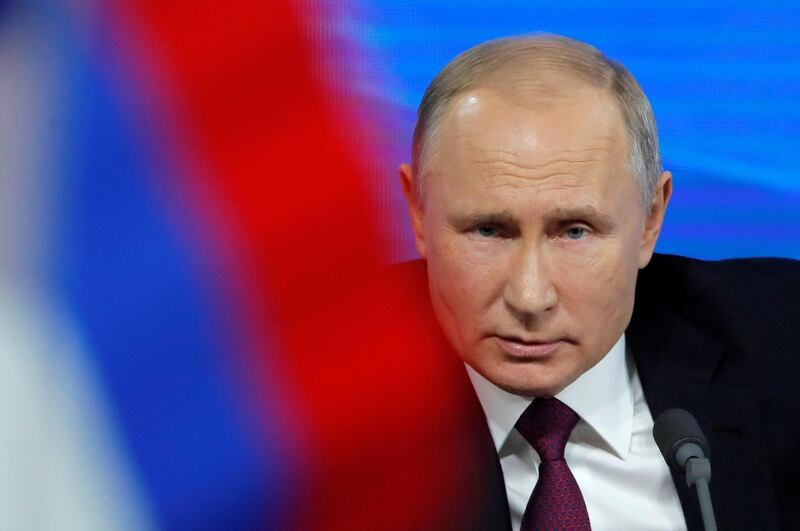Hardly a day passes in Washington without some new evidence emerging about the scale and extent of Russia’s unwelcome meddling in America’s affairs.
And as American lawmakers consider how best to respond to Moscow’s various attempts to destabilise their political system, there is mounting evidence that many countries in Europe, including Britain, are also being targeted as part of the Kremlin’s attempts to sow political discord among western powers.
The most damning assessment of Russia’s malign activities in the US came this week with the long-awaited publication of a report by the US Senate intelligence committee, which comprises both Republican and Democrat senators, into Russian meddling in the 2016 presidential election contest.
The report found black voters had been discouraged from going to the polls by social media campaigns, which published material designed to persuade them to abstain from the vote and cast doubt and disillusionment on the Democratic candidate, Hillary Clinton.
The campaign is said to have been run by the Internet Research Agency, a St Petersburg-based company, which targeted adverts on Facebook and Instagram at users who had shown interest in Malcolm X or the Black Panthers, and created websites designed to attract the interest of black voters with URLs such as blacktivist.info.
The report concluded that the campaign was designed to exploit existing grievances among black Americans about issues such as police brutality.
Fake accounts designed to look like they belonged to Americans were created on Facebook, Instagram, Twitter, YouTube and Tumblr, as well as many other social networks.
The report has already provoked an angry response from America’s black community, with the US civil rights group, the National Association for the Advancement of Coloured People, declaring it was launching a “digital protest” against Facebook, one of the social media platforms targeted by the Russians, because of “the tech company’s history of data hacks which unfairly target its users of colour”.
It has launched a campaign to encourage supporters to log out of Facebook and Instagram, which is part of the same company, for a week, and called on Congress to investigate Facebook more closely.
The association said it had returned a donation recently received from the company.
But congressional investigators looking into the scale of Russia’s well-coordinated attempt to undermine and disrupt the American political system believe that the evidence made public so far is only the tip of the iceberg.
Investigators have already uncovered evidence of Russian activity that extends far beyond the more obvious parameters. They believe the Russians have been meddling in areas of policy-making ranging from fracking to environmental issues.
The breadth of Russian interference was highlighted earlier this month following the conviction of a Russian female spy who attempted to infiltrate the National Rifle Association. Maria Butina, a Russian agent who ran a group called Right to Bear Arms, pleaded guilty this month to trying to join the NRA to influence US policy towards Russia.
But while the main concern of US investigators is to expose the sheer scale of Russia's sophisticated disinformation campaign, in Washington the political focus is how much damage the revelations might impinge directly on president Donald Trump. The accusation, for example, that Michael Flynn, Mr Trump's former national security adviser, lied to the FBI over his contacts with the Russian ambassador to the US during the 2016 election campaign has increased pressure for the White House to provide full disclosure on Mr Trump's dealings with Russia.
So far as Moscow is concerned, the very fact that Mr Trump is embroiled in a political dispute over his relations with Russia will give the Kremlin satisfaction, and the Russians will conclude that so long as the American president is preoccupied with domestic political issues, he will have less time to spend on other matters.
Nor are Moscow's tactics confined to the US. There is growing evidence that Russia is employing the same methods in Europe in an effort to undermine the effectiveness of its governments and organisations such as Nato to confront Russian acts of aggression.
In Britain, this has prompted the government to draw up a list of key Russian oligarchs such as Oleg Deripaska who are thought to be close allies of Mr Putin with a view to imposing measures to limit their ability to move and operate freely in the UK.
But perhaps the most worrying aspect concerning the growing body of evidence that is emerging about Russian interference around the globe is that Russian President Vladimir Putin seems to be in a state of total denial about his country’s activities.
This was clearly evident in his annual marathon press conference in Moscow yesterday when, rather than making any acknowledgement of Russian meddling in the US and elsewhere, Mr Putin instead tried to blame America for the recent growth in tensions between the two countries.
He placed all the blame on the US for abandoning a Cold War-era nuclear arms treaty, saying that the risk of a devastating war could not be underestimated, one that could lead to "the death of all civilisation".
Certainly, the fact that the Russian leader is incapable of accepting his own culpability in creating this dangerous stand-off in the first place does not bode well for global security in 2019.
Con Coughlin is the Daily Telegraph’s defence and foreign affairs editor





